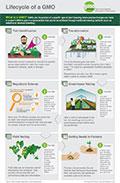Question
I understand that for the most part GMOs dont pose any immediate health risks, but is there potentially severe longterm, as in generational effects from GMO consumption?
Submitted by: Naples
Answer
Expert response from Community Manager
Moderator for GMOAnswers.com
Friday, 05/06/2015 14:20
Many of our contributors have discussed judging the future effects of GMOs for generations to come.
Bruce M. Chassy, professor emeritus of food safety and nutritional sciences, Department of Food Science and Human Nutrition at the University of Illinois at Urbana-Champaign, highlighted how scientists work to predict future consequences:
“The question asks whether science can predict the future. The answer to that question is no and yes. Science is the best system available for making extrapolations about what is most probable in the future. Climate-change science is a good example. No, the world hasn’t gotten as warm as it is going to get in 50 years, but scientists are confident that if current trends continue, it will get much warmer. That’s using science to predict the future. Can science predict with 100 percent certainty? Absolutely not! We all have different personalities. To some of us, a glass is half full; to others, it is half empty. When we think about change — as, for example, adopting GM crops — some of us see risks and others of us see benefits. That’s just human nature, and we are fortunate that the risk-averse among us help us to look before we leap into a bad situation. It is, however, worth pointing out that for all the claimed failures, like DDT and thalidomide, there are literally thousands, if not millions, of new products and technological innovations that bring benefits without serious unwanted side effects.”
Denneal Jamison-McClung, PhD, associate director, UC Davis Biotechnology Program, noted how humans have been modifying foods for millennia, so judging long-term human health is a question of “relative risks”:
“Most people do not realize that plant breeders have been randomly altering and admixing plant genomes for centuries. … Given that we’ve been genetically modifying plants for millennia, using one approach or another, we should frame this question in terms of relative risks: How ‘sure’ can we expect to be when it comes to long-term health impacts of GMO foods? As with most things in life (except death and taxes, as the saying goes), 100 percent certainty is not possible or reasonable to require. However, safe use of GM foods since 1996, coupled with our knowledge of human and plant physiology, points to long-term safe use of genetic engineering as a plant breeding tool set in agriculture.”
Finally, Peter J. Davies, professor of plant physiology and international professor of plant biology at Cornell University, further outlines how scientific evidence points toward GMOs’ presenting no health issues in the long term:
“It is impossible for science to absolutely prove a negative. I can’t prove that you won’t be attacked by an emperor penguin next year; I can report only that, from our knowledge of penguins, almost certainly this will not occur, but no matter how much research is done, I can’t prove it. The same applies to GM foods. The science says that there should be no harm, and reliable studies to date have not shown any harm, but we cannot prove that there will never be any harm. All we can say is that all the evidence points toward GM crops’ being no different from non-GM crops of the same species with regard to safety for the traits currently approved and on the market.
“GM crops are not expected to present any new food risk, as the changes are simply in molecules (protein and DNA) that have been in our diet forever, and the small quantity of added material is degraded in our gut in exactly the same way as has always occurred. There has been very extensive safety testing carried out in many countries around the world, and GM crops have been found to be no different from non-GM crops of the same species in terms of food safety or environmental effects.”
GMO Innovation Contest Recap!
